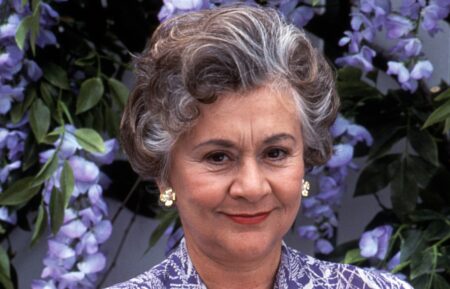Acknowledged as one of the finest stage actresses of her generation, Joan Plowright unexpectedly put her burgeoning career on hold in order to focus her young family and famous husband, Sir Laurence Olivier, prior to enjoying a sudden resurgence at the age of 60. Having honed her performance skills on the stages of London's Old Vic and Royal Court Theatres, Plowright impressed with supporting roles in films like "Time Without Pity" (1957) and "The Entertainer" (1960), the latter film starring future husband Olivier.
Despite this early success, she spent much of the 1960s and '70s dividing her time between family duties and occasional stage work with Olivier. Eventually, Plowright made a tentative return to film in projects such as "Brimstone and Treacle" (1982) and "Drowning by Numbers" (1988), although it was in the years that followed the passing of Olivier that her own career experienced new life. Suddenly reinvigorated, the actress appeared in an astounding number of films and television programs throughout the next decade, including acclaimed turns in "Avalon" (1990), "Enchanted April" (1992), "Stalin" (HBO, 1992), "Widow's Peak" (1995) and "Tea With Mussolini" (1999).
In 2004, she reached her late husband's vaunted status in the U.K. when she was awarded the title of Dame Joan Plowright by Queen Elizabeth II. Continuing to appear in such films as "The Spiderwick Chronicles" (2008), Plowright remained as vibrant on screen as she had 50 years earlier.
Born Joan Ann Plowright on Oct. 28, 1929, in Brigg, Lincolnshire, England, she was the daughter of Daisy Margaret and William Ernest Plowright, a newspaper editor. Raised in nearby Scunthorpe, she was encouraged by her mother to participate in the productions of the amateur theater group that she oversaw. Despite her father's misgivings, the young Plowright pursued her growing acting ambitions, and at the age of 15, won an amateur theater prize, which included a week's run performing in a production with the Harry Hanson Players.
Although being discouraged against following her dream by a curmudgeonly Mr. Hanson, she returned to her theatrical studies with a stint at the Laban Art of Movement Studio after graduating high school. After making her professional stage debut in a 1948 production of "If Four Walls Could Talk," it was off to London, when Plowright received a two-year scholarship to study at the prestigious Old Vic Theatre School. Following her London stage debut in 1954, Plowright became a member of the Royal Court Theatre in 1956, where she appeared in such productions as "The Crucible" and "The Country Wife." It was during a performance of the latter play that a certain Laurence Olivier, who was sitting in the audience with his then-wife, actress Vivien Leigh, first noticed Plowright. In interviews years later, the man many deemed the greatest actor of his generation, freely admitted that he was instantly smitten.
Meanwhile, Plowright, who had previously appeared in a handful of British television productions, made her feature film debut with an uncredited turn in American director John Huston's epic adaptation of Herman Melville's "Moby Dick" (1956), starring Gregory Peck as the obsessed Captain Ahab. In 1957, she took over the role of Jean, the daughter of fading music hall performer Archie Rice (Olivier) in playwright John Osborne's acclaimed drama "The Entertainer." By all accounts, it was during the course of the production and its subsequent run on Broadway that the actors fell in love. Steadily gaining notoriety, Plowright landed her first significant film role in Joseph Losey's taut British thriller "Time Without Pity" (1957). Later, she starred as Lady Teazle in a taped-for-television performance of Richard Sheridan's "The School for Scandal" (BBC, 1959), followed by the feature film adaptation of "The Entertainer" (1960), once again opposite Olivier in the title role. By then, Plowrights' marriage to British actor Roger Cage had ended, as had Olivier's 20-year union with the mentally ill Leigh. Now free to publicly acknowledge their relationship, the couple quickly married in 1961. For her Broadway performance as the unwed mother in "A Taste of Honey" that same year, Plowright received a 1961 Tony Award for Best Actress.
Surprising many, Plowright, whose professional trajectory was on a definite upswing, chose to spend the better part of the next two decades raising her growing family in order to allow her more famous husband to focus on his career. Still making time for periodic work on the stage, she was triumphant in a production of George Bernard Shaw's "St. Joan" (1963), and played Sonya in a recorded mounting of Anton Chekhov's "Uncle Vanya" (1963). Plowright later made her directorial debut with "Evasion of Woman" at the Old Vic Theater in 1969, prior to returning to the cineplex in a film adaptation of Chekhov's "Three Sisters" (1970), co-directed by Olivier, who performed in the production as well. That same year, she also appeared as Portia opposite Olivier's Shylock in a performance of Shakespeare's "The Merchant of Venice" with the National Theatre. She eventually returned to the London stage with a glowing performance in the title role of the 1977 production of "Filumena," in addition to taking on a rare film role for director Sidney Lumet in the adaptation of playwright Peter Shaffer's psychological drama "Equus" (1977), starring Richard Burton. In 1980, Plowright reprised her role of Filumena on Broadway, which would mark the beginning of her transition from work primarily on stage, to an increased emphasis on film.
Plowright began her return to film in screenwriter Dennis Potter's suburban gothic oddity, "Brimstone and Treacle" (1982), which starred pop star Sting as a mysterious stranger who may or may not be the devil incarnate. Seeming to enjoy working in darkly bizarre projects, she took part in writer-director Peter Greenway's "Drowning By Numbers" (1988; released in the USA in 1991), cast as the murderous mother of two equally deadly sisters, all of whom share the name of Cissie Colpitts. After Olivier's death from cancer in 1989, Plowright - suddenly out from under the great thespians' shadow - experienced a late-career renaissance as a character actress in film. Her cinematic second life began with a turn as a mother unsuccessfully trying to assist her daughter (Tracey Ullman) in the murder of her philandering husband (Kevin Kline) in director Lawrence Kasdan's dark comedy "I Love You to Death" (1990). Right on its heels came writer-director Barry Levinson's third entry in his Baltimore trilogy, "Avalon" (1990), in which she played the matriarch of a Polish-Jewish immigrant family. With her Golden Globe-winning portrayal of the waspish Mrs. Fisher in director Mike Newell's "Enchanted April" (1992), Plowright now found herself in high demand as a character player.
More as a treat for her grandchildren than to satisfy any creative need, Plowright played the saintly wife to Walter Matthau's Mr. Wilson in the big screen adaptation of the classic comic strip, "Dennis the Menace" (1993), in addition to a brief appearance in the Arnold Schwarzenegger self-referencing satire "Last Action Hero" (1993). She then offered a slight variation of the Mrs. Fisher character in the comedy-drama "Widow's Peak" (1994), alongside Mia Farrow and Natasha Richardson. Working at a breakneck pace, she was also seen in director Roland Joffé's critically-reviled interpretation of "The Scarlet Letter" (1995), Franco Zeffirelli's criminally under-seen version of Charlotte Brontë's "Jane Eyre" (1996), the Merchant-Ivory production of "Surviving Picasso" (1996), and as the stalwart nanny in Disney's live-action remake of "101 Dalmatians" (1996), to name but a few. After a featured role in the romantic drama "Dance With Me" (1998), Plowright made her first venture into weekly television as a cast member on the sitcom "Encore! Encore!" (NBC, 1998-99). Cast as the feisty owner of a Napa Valley vineyard and the mother of a former opera star (Nathan Lane), the actress provided several of the short-lived show's most over-the-top moments.
Barely slowing down, Plowright once again played one of her signature English upper crust characters in Zeffirelli's semi-autobiographical "Tea with Mussolini" (1999), alongside Cher and fellow British theater grand dames, Judi Dench and Maggie Smith. Easily moving from period drama to contemporary comedy, later projects included a turn as an eccentric billionaire in the Steve Martin-Queen Latifah pairing "Bringing Down the House" (2003). She delivered a charming performance as a retired woman who unexpectedly finds a dear friend in a young, aspiring writer (Rupert Friend) in "Mrs. Palfrey at the Claremont" (2005), and playfully lent her voice to the animated family feature "Curious George" (2006), as Ms. Plushbottom. Plowright was also perfectly cast as the kindly, but misunderstood Aunt Lucinda in the big screen adaptation of the beloved children's fantasy book series "The Spiderwick Chronicles" (2008). Other late career roles included a turn in the gothic thriller "Knife Edge" (2009), and an appearance alongside Chevy Chase in the holiday family comedy "Goose on the Loose" (2011).

































































































































































